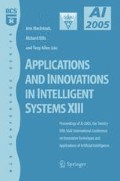Abstract
Knowledge engineers have been working in the legal domain since the rise of their discipline in the mid-eighties of the last century. Traditionally their main focus was capturing and distributing knowledge by means of the knowledge-based systems, thus improving legal access. More and more legal knowledge engineering has become an analytical approach that helps to improve legal quality. An example is the POWER-approach developed in a research programme that is now finished. This programme was run by the Dutch Tax and Customs Administration (DTCA in Dutch: Belastingdienst) and some partners (see e.g. Van Engers et al., 1999, 2000, 2001, 2003 and 2004). The POWER-approach helped to improve quality of (new) legislation and codify the knowledge used in the translation processes in which legislation and regulations are transformed into procedures, computer programs and other designs. We experienced that despite these clear benefits implementation proved to be far from easy. In fact the implementation phase still continues. Adapting research results in public administrations is a tedious process that takes lots and lots of energy and requires continuous management attention. Learning at organisational level proved to be much harder than we thought.
Parts of the material described here have been published before (see e.g. Van Engers 2004).
Tom M. van Engers was programme manager of the POWER research programme and coordinator of the IST funded E-Power project.
Access this chapter
Tax calculation will be finalised at checkout
Purchases are for personal use only
Preview
Unable to display preview. Download preview PDF.
References
Van Engers, T.M., Kordelaar, P., 1999, POWER: Programme for an Ontology based Working Environment for modeling and use of Regulations and legislation. Proceedings of the ISMICK’99.
Van Engers, T.M., Kordelaar, P.J.M., den Hartog, J., Glassée, E., 2000, POWER: Programme for an Ontology based Working Environment for modeling and use of Regulations and legislation. In Proceeding of the 11th workshop on Database and Expert Systems Applications (IEEE) Eds. Tjoa, Wagner and Al-Zobaidie, Greenwich London, ISBN 0-7695-0680-1, pp. 327–334.
Van Engers, T.M., Gerrits, G., Boekenoogen, M.R., Glassée E., Kordelaar, P., 2001, POWER: Using UML/OCL for Modeling Legislation — an application report. Proceedings of the ICAIL 2001, St. Louis.
Van Engers, T.M., Glassée, E., 2001, Facilitating the Legislation Process using a shared Conceptual Model. In: IEEE Intelligent Systems January 2001, p. 50–57.
Van Engers, T.M., Van Driel, L., Boekenoogen, M., 2002, The effect of formal representations formats on the quality of legal decision-making, in Legal Knowledge and Information Systems (Bench-Capon, Daskalopulu, Winkels eds.), IOS Press Amsterdam, ISBN 1 58603 299 2, p 63–71.
Van Engers, T.M., Boekenoogen, M.R., 2003, Improving Legal Quality: an application report, in proceeding of ICAIL2003.
Van Engers, T.M., Legal engineering: A knowledge engineering approach to improving legal quality. In J. Padget, R. Neira, and J.L. De León, editors, eGovernment and eDemocracy: Progress and Challenges, pages 189–206. Instituto Politéchnico Nacional Centro de Investigacion en Computación, 2004. ISBN 970-36-0152-9.
Glassée, E., Van Engers, T.M., Jacobs, A., 2003 POWER: An Integrated Method for Legislation and Regulations from their Design to their Use in E-government Services and Law Enforcement, in Digital Legislation (ed Moens), die Keure, Brugge, ISBN 90 5958 039 7, p175–204
Preece, Shingal, 1994, Foundation and Application of Knowledge Base Verification, International Journal of Intelligent Systems, 9, 683–701
D’Souza D.F. and Wills A.C., 1999, Objects, components and frameworks with UML: the Catalysis approach, Addison-Wesley, ISBN 0-201-31012-0.
Spreeuwenberg, S., Van Engers, T.M., Gerrits, R., 2001, The Role of Verification in Improving the Quality of Legal Decision-Making, in Legal Knowledge and Information Systems, IOS press, ISSN 0922-6389.
Vanthienen, J., Mues C., Wets, G., 1997, Inter-Tabular Verification in an Interactive Environment, Proceedings Eurovav 97, 155–165
Voermans, W., 2000, Computer-assisted legislative drafting in the Netherlands: the LEDA-system, A National Conference on Legislative Drafting in the Global Village
Author information
Authors and Affiliations
Editor information
Editors and Affiliations
Rights and permissions
Copyright information
© 2006 Springer-Verlag London Limited
About this paper
Cite this paper
van Engers, T.M. (2006). Legal Engineering: A structural approach to Improving Legal Quality. In: Macintosh, A., Ellis, R., Allen, T. (eds) Applications and Innovations in Intelligent Systems XIII. SGAI 2005. Springer, London. https://doi.org/10.1007/1-84628-224-1_1
Download citation
DOI: https://doi.org/10.1007/1-84628-224-1_1
Publisher Name: Springer, London
Print ISBN: 978-1-84628-223-2
Online ISBN: 978-1-84628-224-9
eBook Packages: Computer ScienceComputer Science (R0)

